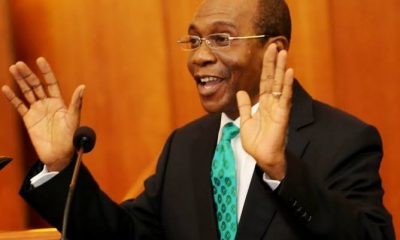Column
OPINION: Nine Years of Emefiele As CBN Gov and Matters Arising
The Detrimental Effect of 9 Years of Mismanagement in the Central Bank of Nigeria under Godwin Emefiele: A Critical Analysis
By Gbenga Titiloye
Introduction:
Over the past nine years, the Central Bank of Nigeria (CBN) has witnessed a tumultuous period marked by bad policy decisions, high-handedness, corruption, and sheer theft. Under the supervision of Godwin Emefiele, these factors have collectively undermined the economic stability and growth of Nigeria, causing severe consequences for its citizens. By employing the five basic objections framework, this essay aims to explore the negative ramifications stemming from these issues in the CBN.
I. Ineffective Policies and Economic Mismanagement:
One of the fundamental objections to the central bank’s performance under Emefiele’s watch is the implementation of ineffective policies. The scarce success of these policies has been overshadowed by mismanagement, resulting in an unstable economic environment. Contrary to the central bank’s mandate of promoting economic stability, frequent currency devaluations, inconsistent monetary policies, and inadequate measures to tackle inflation have all contributed to Nigeria’s economic woes.
II. Violation of Transparency and Accountability:
Another key concern is the prevalent corruption and lack of transparency in the CBN. The absence of robust accountability mechanisms has allowed officials to engage in corrupt practices and theft, undermining public trust in the banking system. This has severe consequences for Nigeria’s investment climate, discouraging foreign direct investment and hindering economic growth. Moreover, the lack of transparency in monetary operations erodes public confidence in the central bank’s ability to manage the economy effectively.
III. Implications for Socioeconomic Development:
The mismanagement in the CBN has had profound implications for Nigeria’s socioeconomic development. Unreliable policies and corrupt practices have limited citizens’ access to credit facilities, stifling entrepreneurial activities and hindering small businesses’ growth. Additionally, inflationary pressures resulting from poor monetary policies disproportionately affect the most vulnerable segments of society, exacerbating income inequality and deepening poverty levels.
IV. Weakening of Financial Institutions’ Integrity:
The erosion of trust caused by the central bank’s mismanagement has damaged the integrity of financial institutions operating within Nigeria. This is particularly concerning as trust is a critical foundation for a thriving banking sector. The loss of public confidence in the CBN’s ability to regulate and safeguard the financial system perpetuates a vicious cycle of distrust, discourages local savings, and impedes secure investment opportunities for both domestic and foreign investors.
V. Long-term Economic Repercussions:
The culmination of nine years of bad policy decisions and corruption in the CBN under Emefiele’s supervision bears long-term consequences for Nigeria’s economy.
The negative effects extend beyond Emefiele’s tenure, hindering future policy implementation and hampering economic recovery. The country’s potential for sustainable growth and development is limited as the consequences of these missteps linger, deterring investors, and burdening future generations with the economic fallout.
Conclusion:
The central bank of Nigeria, under the leadership of Godwin Emefiele, has witnessed a period marred by ineffective policies, corruption, and a lack of transparency.
The repercussions of these factors ripple throughout Nigeria’s economy, obstructing economic stability, undermining socioeconomic development, and eroding public trust in their financial institutions.
Recognizing the detrimental effects of this mismanagement is crucial for Nigeria to move forward and implement necessary reforms to restore confidence in monetary and fiscal policies, ensuring a prosperous future for its citizens.
Gbenga Titiloye writes from Abuja
Contact: info@royalnews.com.ng
















